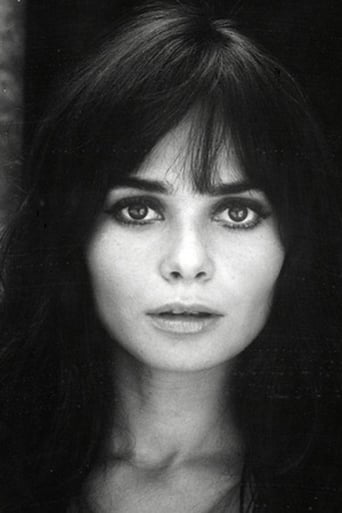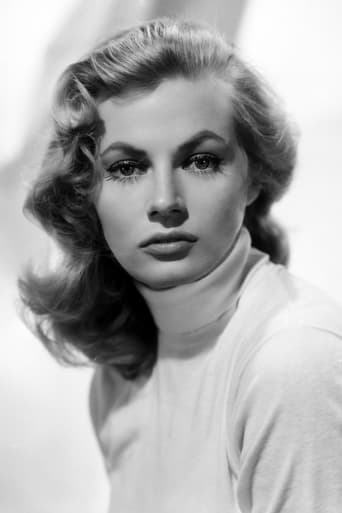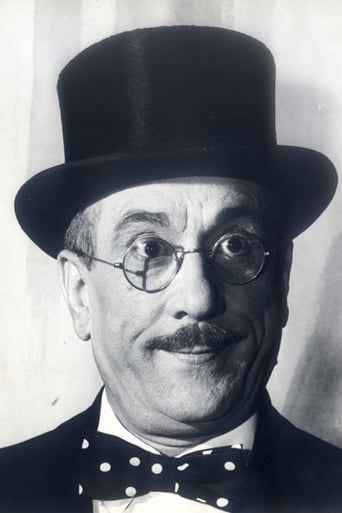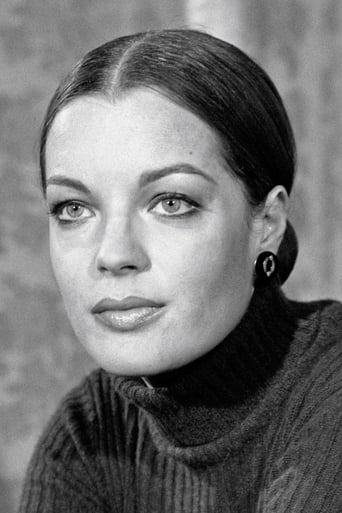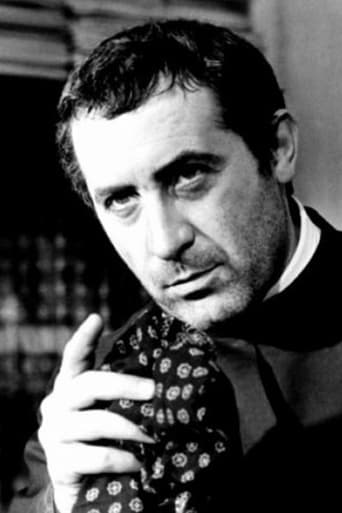Exoticalot
People are voting emotionally.
Nessieldwi
Very interesting film. Was caught on the premise when seeing the trailer but unsure as to what the outcome would be for the showing. As it turns out, it was a very good film.
AnhartLinkin
This story has more twists and turns than a second-rate soap opera.
JoeKulik
Boccaccio '70 (1962) is a very heavy film, in my opinion.My interpretation of it is that the outward and blatant sexual aspect of each of the four episodes of this cinematic anthology is a mere superficial veneer, a literary artifice, if you will, that is used as a vehicle for a biting commentary on modern social life, a life disrupted and transformed by the emerging corporate and technological forces impinging upon the individual.Although the outward social situation portrayed in each episode appears to be so different from the others, it seems to me that there was, at some level, a unified coordination behind the production of this film, ensuring that the social commentary portrayed by the film as a whole film was consistent, in some respects. Yet, each individual episode voices this unified social commentary from its own unique perspective.The sexual aspect of the film as a whole is the common point in each episode that is used as a symbol of the basic humanity of the individual. Hence, it is during the execution of the sex act itself that the individual is stripped of all his assigned social roles, and their attendant assigned social personas, and where the individual is most closely in touch with his inner, true, genuine self. It is also during the very execution of the sex act where an individual can find a time in his life that is outside the scope, and the purview of impinging societal forces.This film was skillfully constructed to project a superficial appearance, greatly along outwardly sexual themes, to ensure the commercial viability of the film, a superficial appearance that would appeal to the masses of the ticket buying public who hunger for simple entertainment. Yet beneath the veil of this general public appeal, lies a carefully constructed harsh social commentary that provides much fodder for intellectual, and artistic analysis for the minority of film viewers who are inclined to such reflective thinking.Boccaccio '70 (1962) is a truly remarkable cinematic achievement for many different reasons, at least in my opinion.
marqymarqy
Boccaccio 70 always struck me as a great title for a film - perhaps because it wasn't afraid of its built in obsolescence. It hasn't been on UK telly since around 1974 - can someone – anyone - please, please, please explain this curious phenomenon to me. What we have here is four short films from four top Italian directors of the time (the time actually being 1961 - another hilarious aspect of the title) including Federico Fellini and Luchino Visconti. The picture quality is superb and may even be mastered from the original negative. The first film of the four is the stand out for me - the director paints a hilarious yet hideous view of the popularist theory of 1961 - population explosion. The scene at the swimming pool really must be seen to be believed - and be seen in colour on the largest screen you can access - the director anticipated High Definition by half a century. The dialogue is Italian with English subtitles. Well worth a look - even though it'll take you 3 hours and 23 minutes to watch the whole film. The release I bought is by umbongo films.
Tim Kidner
Though an ardent Fellini fan, it took me some time before getting round to buying this 'portmanteau' of four separate stories from Italy's leading directors of the time.Which was actually 1962 and not the 1970 that the title suggests. Portraying love, sex and lust in the 'modern age' hence the futuristic date in the title each part is 50 minutes long and in my experience, is best watched in two sittings. You'll probably have read that as well as Fellini, Vittorio de Sica, Luchino Visconti and Mario Monicelli, all but the last being very well known to knowledgeable film buffs.It takes nine writers, including input and ideas from the directors themselves to mould the very different stories here. The women definitely hold the upper hand in every one of them, loftily placed on pedestals - busty Anita Ekberg in Fellini's; Romy Schneider in Visconti's and Sophia Loren in de Sica's.The first segment, from Monicelli, is actually a bonus on the DVD as it was apparently cut from theatrical releases shown outside Italy. But, actually, that part is a good setting point - ordinary young female factory workers who live with the worry of everyday life and love and the hanging threat of old traditions, the Church and ruthless employers who attempt to quell their youthful desire for sex. Some scenes, with busy trams and bustling street scenes at rush-hour, remind me of the earlier classic 'Bicycle Thieves'.Visconti's part is a talky - and fairly boring - 'discussion', fixed to one nice, very posh apartment. The subject is now rather ordinary, probably unlike then, that I'm wanting more substance and variety. There again, I never was 'into' Visconti - high on style and period detail but low on flair and exuberance, at least compared to the others.Fellini was in the late autumn of his career at this point and this manifests itself by him displaying some trademark vaguely tasteless wit, swipes at Catholicism and Authority but surprising us with some truly inspiring set-pieces. His first foray into colour, it's a very bumpy and uneven ride, bounding from barely watchable to reassuringly great and familiar.A young and very shapely Sophia Loren, under De Sica, is used to portray many themes in neo-realist Italian cinema - Life itself. Outdoor fairs, sultry night-times when lovers and larger-than-life characters come out to play and village pettiness all affect this red-dressed temptress, who, like so many, yearn for greater and better things. It's at a touch funny and sad, but oddly, not as compelling as it should be. Though never the greatest actress, Loren doesn't let the side down, but her raw physical beauty always means that is what is seen first, before emotional depth.Critical reviews vary - some quarters saying that it's a lot of wasted talent. My immediate response is that all the directors and key players have done far better work and those seeking them out for the first time should look elsewhere - I'd hate for anyone to be put off potentially brilliant Italian cinema by them watching this and being disappointed.However, for Completists, like me, who have seen and loved these great director's best films, then the draw will become insufferably great and purchase will become inevitable. At least this quality transfer Mr Bongo release allows us to sample this odd collection at a good value price.
rogierr
These three directors definitely distinguish themselves here from each other without being cocky. Well, Fellini and Ekberg may be VERY audacious, but that just adds positively to his work in my opinion. In his segment 'The temptations of Dr. Antonio' is enough material to fill an entire feature. It brings big fun and surrealism in a story about a very BIG billboard with a picture of Anita Ekberg on it holding a glass of milk. A moralistic guy (censor?) who lives right in front of the billboard (and BTW gets a very funny introduction in the film) can't accept the supposedly scandalous picture and takes action. After seeing it, I couldn't get this tune out of my head: 'Bevete piu latte' (you must drink milk) which is a commercial tune for the billboard. It is all very carnavalesque, versatile and entertaining. It's a pity Giuseppe Rotunno (Amarcord, Città delle donne, il Gattopardo, Carnal Knowledge) didn't dignify this segment with his cinematography (as he DID with Visconti's poetic segment which has a much more distinct atmosphere and has less special effects).The common factor between the three segments is a (light) moral discussion about what sexual borders people can have and what must occur to make them actually think about it. Where exactly lies the border of your taboos? The film is also watchable as plain entertainment, for the three starring ladies are captivating and intense here (though in general I don't like Ekberg that much). Romy Scheider played a girl in the silly 'Sissy' (1955-57), but is already glorious with her subtle impression in this segment of a mature lady who gets double-crossed by her fiancee and takes revenge.I didn't see the segment 'Renzo e Luciana' unfortunately, because it was unavailable :(, but I guess I liked Fellini's part best and De Sica's least (as most of his work): De Sica had some better short films in 'Ieri, oggi, domani' (1963, all starring Sophia Loren). Or it could be that I liked the first two segments best, because there was Nino Rota's (Godfather, Amarcord) score under them. De Sica's segment is just not interesting in any way. Nevertheless this is a triptych of the highest order: underrated.9/10

